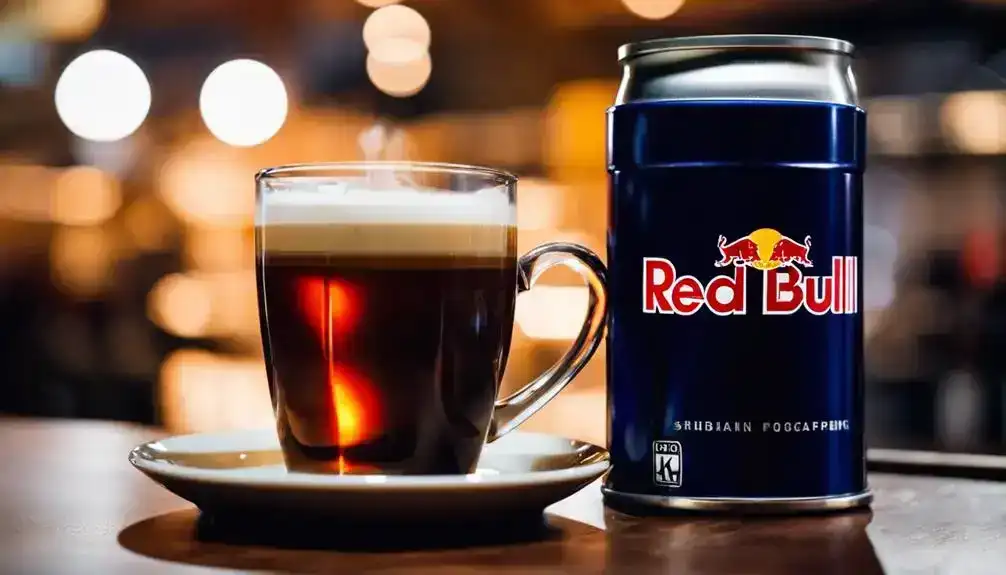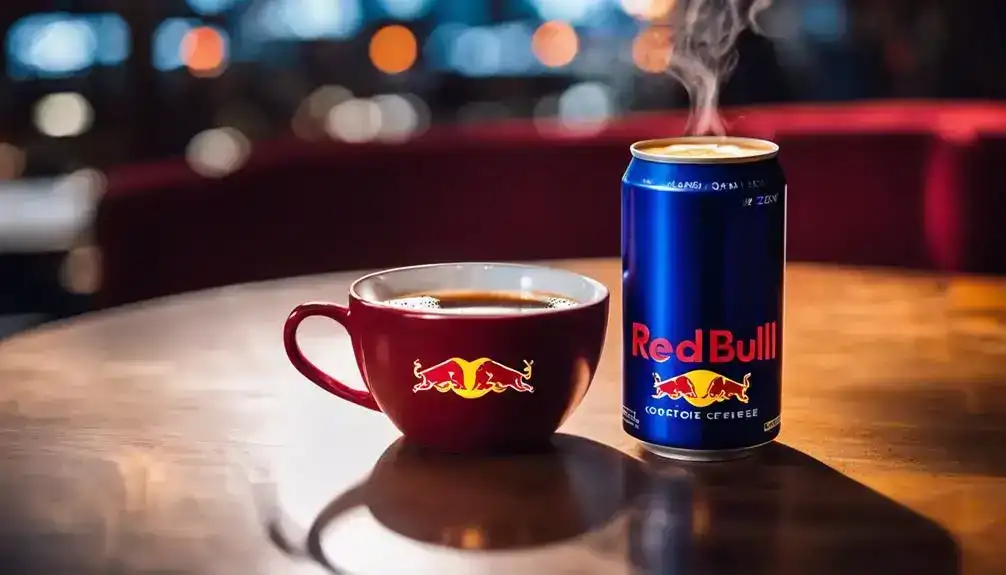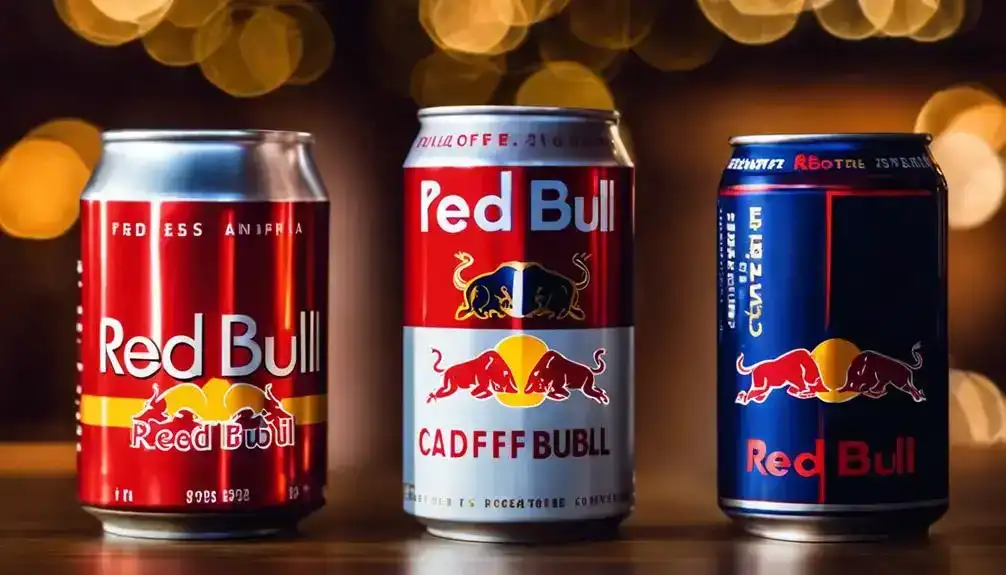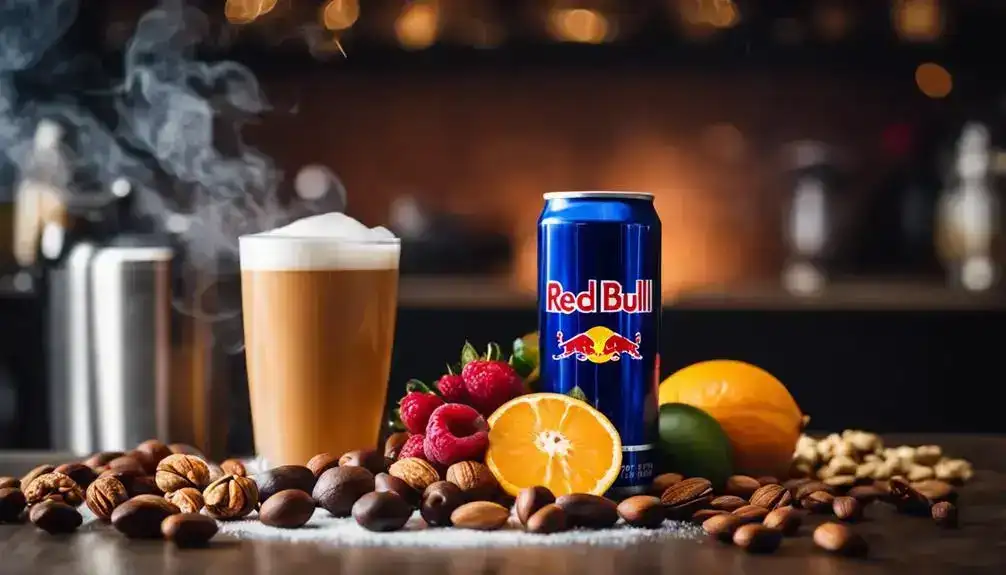Red Bull contains a consistent 80 mg of caffeine per 8.4-ounce serving, while coffee’s caffeine levels vary with brewing methods and beans. Drip coffee averages 95 mg in an 8-ounce cup, espresso about 63 mg per 1-ounce shot, and cold brew 100-200 mg in an 8-ounce serving.
Coffee offers versatility in caffeine content, Red Bull maintains a set level. Additionally, Coffee contains over 1,000 compounds like antioxidants, protecting against diseases. Enjoy the unique benefits each drink provides.
How Does Caffeine Content Differ Between Coffee and Red Bull?

When comparing the caffeine content between coffee and Red Bull, coffee generally contains varying amounts of caffeine depending on factors such as brew method and bean type, whereas Red Bull consistently contains about 80 mg of caffeine per 8.4-ounce can.
caffeine sources in coffee stem from the brewing process and the type of coffee bean used, leading to a wide range of caffeine levels. On the other hand, Red Bull’s caffeine content remains stable at 80 mg per serving, making it a reliable energy drink option.
This energy drink comparison showcases the versatility of coffee regarding caffeine content, while Red Bull provides a consistent caffeine boost for those seeking a standardized energy drink option.
How Much Caffeine is in Coffee?

Coffee’s caffeine content varies based on the brewing method and type of beans used. Different brewing techniques such as drip, espresso, and cold brew result in varying caffeine levels per serving.
Understanding these differences can help you choose the coffee type that aligns with your caffeine preferences and consumption needs.
Caffeine Levels Based on Brew Method and Type
When exploring the caffeine levels in coffee based on the brew method and type, it’s crucial to understand the variations that exist. Different brewing methods and coffee bean types significantly influence the caffeine content in your cup.
To grasp this concept better, let’s compare drip coffee, espresso, and cold brew, along with examining the average caffeine range per serving.
- Drip Coffee contains 95 mg per 8-ounce cup on average.
- Espresso has about 63 mg per 1-ounce shot.
- Cold Brew can range from 100-200 mg per 8-ounce serving.
- An average cup of coffee usually contains between 80-200 mg of caffeine.
Drip Coffee, Espresso, and Cold Brew Comparisons
The caffeine content in different coffee brew methods varies greatly, with drip coffee containing an average of 95 mg per 8-ounce cup, espresso having about 63 mg per 1-ounce shot, and cold brew ranging from 100-200 mg per 8-ounce serving.
| Coffee Type | Caffeine Content (mg) |
|---|---|
| Drip Coffee | 95 |
| Espresso | 63 |
| Cold Brew | 100-200 |
Average Caffeine Range Per Serving
On average, the caffeine content in a serving of coffee can range from 80 to 200 mg, depending on factors such as the brewing method and type of coffee bean used.
This range varies considerably compared to Red Bull’s consistent 80 mg per 8.4-ounce serving.
Understanding these differences can help you make informed choices based on your caffeine needs and preferences for serving sizes.
How Much Caffeine is in Red Bull?

Red Bull’s caffeine content is consistent across most varieties, with an 8.4-ounce can containing about 80 mg of caffeine.
Larger cans like the 12-ounce version typically contain around 110-120 mg per can.
Understanding the standardized caffeine levels in Red Bull can help you make informed choices about your caffeine intake.
Standard Caffeine Content per Can
When comparing the caffeine content in different sizes of Red Bull cans, it’s essential to note the variations in caffeine levels. Larger cans, such as the 12-ounce version, generally contain more caffeine than the standard 8.4-ounce can. This difference in caffeine content can impact the overall stimulant effect experienced by individuals consuming Red Bull.
| Can Size (oz) | Average Caffeine Content (mg) |
|---|---|
| 8.4 | 80 |
| 12 | 110-120 |
Comparing 8.4 oz, 12 oz, and Larger Cans
The caffeine content in Red Bull varies depending on the size of the can, with larger cans like the 12-ounce version typically containing around 110-120 mg per serving.
| Can Size | Caffeine Content (mg) |
|---|---|
| 8.4 oz | 80 |
| 12 oz | 110-120 |
| Larger Cans | Varies |
What Are the Other Ingredients in Coffee and Red Bull?
Both coffee and Red Bull contain unique additional compounds beyond caffeine that contribute to their overall composition.
Coffee is rich in antioxidants like chlorogenic acid, known for its anti-inflammatory properties and potential health benefits.
Red Bull, on the other hand, includes ingredients such as taurine and B vitamins, alongside a notable sugar content which can impact health outcomes.
Coffee’s Additional Compounds
Coffee isn’t just about caffeine; it contains over 1,000 compounds, including powerful antioxidants like chlorogenic acid. These antioxidants play an essential role in reducing inflammation, protecting against diseases, and promoting overall health benefits.
Understanding the additional compounds in coffee sheds light on its potential positive impacts beyond just its caffeine content.
Antioxidants and Their Benefits
In coffee, the presence of antioxidants, such as chlorogenic acid, contributes to its health benefits by aiding in reducing inflammation and protecting against certain diseases.
- Antioxidants in coffee offer protection against chronic diseases.
- Chlorogenic acid in coffee may help lower the risk of heart disease.
- Regular coffee consumption is linked to a reduced risk of type 2 diabetes.
- Antioxidants in coffee can aid in reducing inflammation.
Red Bull’s Unique Ingredients
When comparing the unique ingredients in Red Bull to those in coffee, it becomes evident that Red Bull contains taurine, B vitamins, and a notable sugar content. These components contribute to the energy-boosting effects of Red Bull but also pose health risks if consumed excessively.
Understanding the specific ingredients in each beverage is vital for making informed choices about caffeine consumption.
- Taurine’s Role in Energy: Taurine, an amino acid found in Red Bull, plays a role in supporting neurological development and may contribute to the energy-boosting effects of the drink.
- B Vitamins for Energy Conversion: Red Bull’s inclusion of B vitamins aids in converting food into energy, providing a quick energy boost to consumers.
- Sugar Content Concerns: With 27 grams of sugar per 8.4-ounce can, Red Bull’s high sugar content can lead to health issues like weight gain and increased risk of diabetes.
- Balancing Benefits and Risks: While the unique ingredients in Red Bull offer immediate energy benefits, it’s crucial to weigh the potential health risks associated with these components.
Taurine, B Vitamins, and Sugar Content
- Taurine supports neurological development.
- B vitamins aid in converting food into energy.
- Sugar content in Red Bull can pose health risks if consumed excessively.
- Taurine and B vitamins contribute to the immediate energy boost provided by Red Bull.
What Are the Health Impacts of Caffeine in Coffee vs. Red Bull?

When evaluating the health impacts of caffeine in coffee versus Red Bull, it’s crucial to take into account both the positive and negative effects.
Coffee, with its antioxidants, can assist in disease prevention such as cancer and heart disease, as well as potentially reduce the risk of type 2 diabetes.
Conversely, Red Bull’s immediate energy boost from caffeine and B vitamins should be weighed against concerns over its high sugar content, which can result in weight gain and other health issues when consumed excessively.
Positive Health Effects
When comparing the positive health effects of caffeine in coffee versus Red Bull, it’s essential to consider their unique attributes.
Coffee is rich in antioxidants, which have been linked to disease prevention, including reducing the risk of cancer and heart disease. Regular consumption of coffee is associated with a lower risk of type 2 diabetes.
On the other hand, Red Bull provides an immediate energy boost due to its caffeine and B vitamins content, which can enhance physical performance.
Red Bull’s caffeine and B vitamins content provides a quick energy boost enhancing physical performance. Red Bull can enhance physical performance due to its specific blend of caffeine and B vitamins.
Coffee: Antioxidants and Disease Prevention
Coffee contains a variety of antioxidants that play an essential role in disease prevention and overall health benefits. These antioxidants provide numerous advantages, including:
- Reduction in inflammation
- Protection against certain chronic diseases
- Enhanced liver health
- Lower risk of type 2 diabetes
Red Bull: B Vitamins and Immediate Energy Boost
Red Bull provides an immediate energy boost and enhances physical performance due to its caffeine and B vitamins content, contrasting with the antioxidant-rich benefits of coffee.
- B vitamins in Red Bull aid in converting food into energy.
- The quick energy boost from Red Bull is attributed to its caffeine content.
- Taurine in Red Bull supports neurological development.
- Red Bull offers an alternative for those seeking an energy drink with B vitamins benefits.
negative health effects
When comparing the negative health effects of caffeine in coffee and Red Bull, it’s important to consider the potential impacts on your well-being.
Coffee can lead to anxiety, sleep disturbances, and increased blood pressure due to its caffeine content.
On the other hand, Red Bull’s high sugar content raises concerns about weight gain, dental issues, and the risk of diabetes and heart disease.
Coffee: Potential Anxiety and Sleep Disruption
High caffeine intake from certain beverages can potentially lead to anxiety, insomnia, and increased blood pressure.
- Anxiety Management: caffeine can trigger or exacerbate anxiety disorders.
- Sleep Hygiene: Consuming caffeine close to bedtime can disrupt sleep patterns.
- Blood Pressure Concerns: Excessive caffeine intake can contribute to elevated blood pressure levels.
- individual sensitivities: People vary in their tolerance to caffeine, affecting how it impacts anxiety and sleep.
Red Bull: Sugar Content and Additives Concerns
Excessive sugar content and additives in Red Bull can lead to weight gain, dental problems, and increased risk of diabetes and heart disease, highlighting negative health impacts associated with the beverage.
- Sweetness concerns: High sugar levels in Red Bull can contribute to weight gain and dental issues.
- Additive dangers: Ingredients like taurine pose potential health risks.
- Diabetes risk: Excessive sugar intake may elevate the risk of developing diabetes.
- Heart disease: The combination of sugar and additives could increase the likelihood of heart problems.
Recommendations for Consuming Coffee and Red Bull

When considering the consumption of coffee and Red Bull, it’s essential to understand your daily caffeine limits recommended by the FDA.
Coffee may be a better choice for daily use due to its lower sugar content and higher antioxidant levels, offering a versatile range of preparation methods.
Your personal preferences and tolerance to caffeine will ultimately guide your decision between the controlled caffeine content of Red Bull and the diverse flavors and brewing styles of coffee.
Understanding Daily Caffeine Limits
It’s recommended by the FDA that most adults should aim to consume no more than 400 mg of caffeine per day to prevent adverse effects.
Exceeding this limit can lead to health implications such as anxiety, insomnia, increased blood pressure, weight gain, dental issues, and a higher risk of diabetes and heart disease.
Understanding caffeine limits is essential in maintaining a healthy balance in your daily consumption of beverages like coffee and Red Bull. Being mindful of your intake can help you avoid negative consequences associated with excessive caffeine consumption.
Remember that moderation is key when it comes to managing your caffeine intake for best health and well-being.
When to Choose Coffee Over Red Bull
Consider the potential health benefits and risks associated with caffeine content, sugar levels, and additional compounds when deciding between consuming coffee or Red Bull. Here are some recommendations for choosing between the two:
Morning Beverage Options:
- Start your day with coffee for lower sugar content and higher antioxidants.
- If you crave a quick energy boost, Red Bull can be an option due to its caffeine and B vitamins.
Energy Drink Alternatives:
- Coffee offers a more natural energy source compared to the artificial additives in Red Bull.
- Opt for coffee over Red Bull when looking for a beverage with additional health benefits and fewer artificial ingredients.
Remember to balance your caffeine intake with your overall health goals and daily limits.
Personal Preferences and Tolerances
Understanding your individual tolerance to caffeine plays a pivotal role in making informed choices between consuming coffee and Red Bull.
Individual preferences and caffeine tolerance vary greatly, influencing which beverage suits you best.
If you have a lower tolerance for caffeine, opting for Red Bull with its consistent 80 mg per 8.4-ounce can might be preferable to avoid jitteriness or sleep disturbances.
On the other hand, if you enjoy the ritual and diverse flavors of coffee, exploring different types like espresso or cold brew could cater to your preferences.
Monitoring your body’s reaction to caffeine intake and aligning it with your taste preferences will help you navigate the world of caffeinated beverages more effectively.
Conclusion
To sum up, when it comes to caffeine content, coffee reigns supreme over Red Bull. On average, a cup of coffee contains around 95 milligrams of caffeine, while a standard 8.4-ounce can of Red Bull only has 80 milligrams.
This significant difference in caffeine levels may impact your daily energy levels and overall well-being. It’s crucial to evaluate the amount of caffeine in your favorite beverages and make informed choices about your consumption for peak health.

